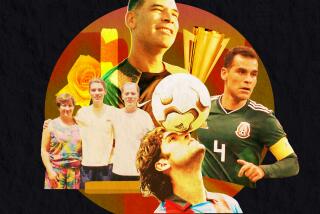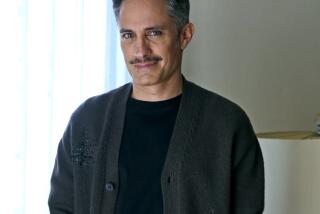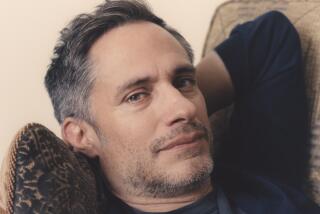‘Intellectual Aerobics’ : Maverick Teacher Is Putting His Beliefs Into Action
- Share via
WHITTIER — Rafael Chabran is crouched in the middle of a circle, a soccer ball clutched against his chest. He sizes up the competition. Suddenly he spins and hurls the ball along with a command in Spanish.
But this is not soccer practice, and Chabran is no coach. He is an internationally recognized scholar who prefers a makeshift playing field to a classroom.
Chabran, chairman of the Department of Foreign Languages and Literatures at Whittier College, is the guy who gets students on the ball--literally. Using a theory known as Total Physical Response, he combines teaching with action.
At first, the students in an introductory Spanish class on a recent morning are not sure what to make of the spry man in wire-rims and tennis shoes. Part mime, part troop-leader, part team captain, he sprints around the circle of students like a Spanish-speaking Pied Piper. By the end of the hour, though, the students are laughing and passing the ball among themselves.
They are also speaking completely in Spanish.
Chabran is an academic maverick who left Louisiana State University in Baton Rouge to come to Whittier, where he practices a new kind of education that one colleague dubbed “intellectual aerobics.”
In the process, he has changed the way some professors on campus teach their classes and the way many students learn. Last year, after less than a decade in Whittier, he also became one of the newest professors ever to win the college’s prestigious Harry Nearhood teaching award.
“He typifies that which Whittier aspires to in teaching,” said Joe Price, a religion professor who has team-taught with Chabran.
“When he holds a text in his hand, it’s as though he’s just encountering it himself for the first time,” Price said.
When Chabran teaches, “it looks like he wants to grab the topic,” said Dennis McGonagle, who took a course called “What Is Reality?” from Chabran last year. The interdisciplinary course, which combines culture and philosophy, is designed to teach students about point of view.
McGonagle remembers being bombarded with questions. “It was like a storm of ideas,” he said.
“Rafael is a highly credentialed and internationally respected scholar who happens to love teaching freshmen,” said Robert Marks, dean of the college. “It’s a wonderful combination--he is not only a scholar of Spanish language and literature, he is a scholar of how students learn.”
Chabran’s scholarly work is published in journals in Spain, Canada and the United States. He recently received a grant from the National Endowment for the Humanities to head a team translating the works of Francisco Hernandez, a 16th-Century Spanish physician credited with introducing American medicinal plants to Europe.
But it is teaching for which he is best known on campus.
Chabran is modest about his teaching technique. “There is not a lot of mystery behind it,” he said. “It’s the way we learned when we were children--by playing, by doing, by being active.” Indeed, Chabran frequently visits his two children’s elementary school classes to observe how youngsters learn.
The use of the soccer ball, however, stems from his interest in fitness. Chabran, who does not have a driver’s license, walks everywhere he can.
“I think there are already enough crazy people driving,” he said.
The soccer ball technique evolved as a way to get students over their anxieties about trying to speak Spanish. They don’t have time to get tongue-tied when they are concentrating on catching the ball, he said.
Although there are no typical Chabran classes, many start with exercise, a warm-up for the vigorous brainstorming to follow.
Then there is the singing. Chabran revs up the students’ vocal chords with songs in Spanish. Those who don’t join in get a stare-down from the professor, whose singing is notable more for its enthusiasm than musical quality.
“God, he’s just so pumped,” said Ramon Arrowsmith, a former Chabran student now in graduate school at Stanford University. “He gets so excited, there’d be little drops of spittle.”
There is more to the secret of Chabran’s popularity on campus than theatricality, however.
He reveres the classic texts of literature, Price said, and he respects the perspectives that the students bring to the discussion.
Students don’t get an “A” in Chabran’s classes by regurgitating information. They are graded on their ability to break down, analyze and put information back together in interesting ways.
In fact, Chabran has always been interested in fitting things together that don’t obviously fit. Although he teaches an occasional class, this year he is on leave from Whittier College to research a book on how Cervantes’ “Don Quixote” relates to the history of medicine in Spain.
Chabran comes by his love of connections, he said, as the product of two cultures. A California native, he was born to Mexican and Puerto Rican immigrants.
Although growing up he spoke Spanish before English, it was two different kinds of Spanish. As a child, he used to wonder why his mother said “naranja” for orange and his father said “chinas. “ He finally made the connection that the two words meant the same thing, he said.
It was partly this passion for connections that drew him to Whittier, one of the few liberal arts colleges in the country using a paired-course curriculum. For example, one of Chabran’s introductory Spanish classes might be paired with an introductory sociology class, or a class on the history of the San Gabriel Valley. Students are required to take paired courses concurrently. And professors work to relate the material.
Through efforts such as paired course work, teachers hope to show students how subjects are related in the real world, Chabran said.
He sees the ability to make connections as imperative to the future of society. “To us, this kind of development is related to critical thinking,” he said. “As society has become more advanced, more technical, we need to know more.”
Profile: Rafael Chabran
Chairman of the Department of Foreign Languages and Literatures at Whittier College * Age: 45
* Education: Bachelor’s degree in Spanish from UC Berkeley in 1970. Master’s degree in Spanish from San Jose State University in 1972. Ph.D. in Spanish from UC San Diego in 1983.
* Career highlights: Taught at community colleges in California. Taught at Louisiana State University from 1983 to 1985. Joined Whittier College faculty in 1985. Presently on sabbatical researching a book: “Cervantes’ Medical Library: Medical Texts as Intertexts in ‘Don Quixote.’ ”






